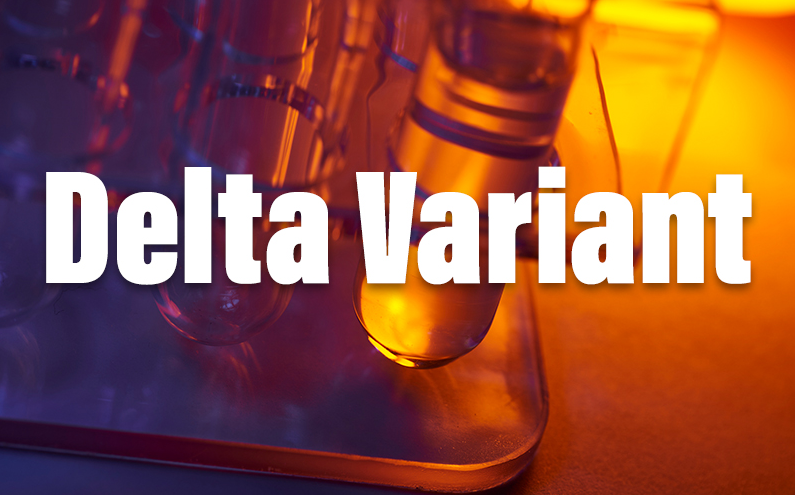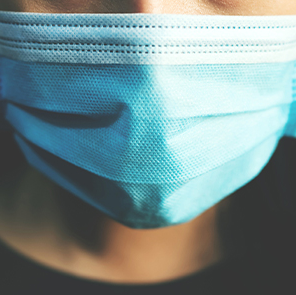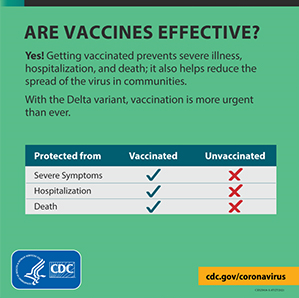The Delta Variant: Your Most Common Questions, Answered (FAQ)

What is the COVID-19 Delta Variant?
Viruses are constantly mutating (aka changing) as they infect new hosts and duplicate themselves. These new mutated versions of the original virus are called variants. These variants can allow the virus to spread more easily and even cause more severe symptoms.
The Delta Variant, sometimes referred to as B.1617.2, was first identified in India back in December 2020 and first detected in the United States in March. The Delta variant is now the most common circulating COVID-19 strain according to the CDC.
The Delta Variant: Should We Be Concerned?
The Delta Variant is the 'fastest and fittest' variant yet, according to the World Health Organization. Emerging research from the CDC suggests that the variant may carry a high viral load even among vaccinated people. In fact, the Delta variant is about 50 percent more transmissible than the COVID-19 Alpha variant (B.117), which in turn was 40-60 percent more transmissible than the original virus strain.

Evidence is still being evaluated, but studies show the following:
- Delta spreads more easily than other variants
- Delta may cause a more severe form of the disease, particularly among those who have not yet been fully vaccinated.
- Delta may have an ability to partially avoid antibody response from both natural infection and vaccination
- Delta may also be less affected by certain monoclonal antibody treatments
The danger here is that an increase in the number of cases will put more strain on healthcare resources, lead to more hospitalizations, and potentially more deaths. This is what we want to avoid here in northern Michigan, especially in those counties where vaccinations are lagging behind the state average.
If this variant becomes common, that means going to church, or to school, or to the store will become that much more dangerous because the transmission rate is that much faster.
Is the Delta Variant affecting fully vaccinated individuals?
-
So far, studies suggest that the available authorized vaccines are working well to protect vaccinated people from the Delta variant’s more serious symptoms that could lead to significant illness, hospitalization and even death.
- A small percentage of vaccinated people may be infected with the Delta variant – however, based on trends, those vaccinated typically feel mild symptoms, if at all.
- Delta is showing slightly reduced vaccine efficacy by about 1-6%
- Current data does suggest skipping a second dose of a two-dose vaccine affects the immune response to Delta – so if you’re scheduled to receive a Pfizer or Moderna two-dose vaccine, please make sure to receive your second dose as scheduled for the highest level of protection.
What can we do to protect ourselves from not only the Delta variant, but any COVID-19 variant circulating in northern Michigan?
Herd Immunity Through Vaccination

The number one thing you can do is make sure you and your eligible family members receive a COVID-19 vaccine at your earliest opportunity.
- Vaccination dramatically reduces the capability for the virus to spread
- And helps lower the chances of hospitalization or severe symptoms
- Make sure to complete both doses if you choose a two-dose vaccine
If you have children returning to school, making sure they receive a vaccine as soon as possible to ensure they’re fully vaccinated by the time team sports begin in late August and by the time in-person school resumes.
Frequent Handwashing
Continue to wash your hands frequently with soap and water to avoid coming into contact with – and spreading – germs and viruses. Use a hand sanitizer with 60 percent or more alcohol if soap and water aren’t available.
Mask Up

If you are not fully vaccinated, continue to wear a mask in public areas to avoid getting or spreading COVID-19 and its variants. 99% of all COVID-19 deaths and the vast majority of inpatient hospitalizations are among unvaccinated individuals. So it’s critically important for this group to remain vigilant and protect themselves as best they can.
What about fully vaccinated people? Due to the high contagiousness of the Delta variant, the CDC is now recommending wearing a mask in indoor public spaces if your area has substantial or high levels of COVID-19.
Finally, avoid crowds and poorly ventilated indoor spaces.
What if I have additional questions or concerns?
Please reach out to Munson Healthcare’s Ask-A-Nurse at 231-935-0951. A team of registered nurses is here for you daily from 7 am to 11 pm at no charge. Our experts are happy to answer any health question you may have whether it’s related to COVID-19 or the vaccines or a health topic completely different.
Related Blogs:
- Munson Minutes | Understanding the COVID-19 Delta Variant
- I Survived COVID-19
- The Long-Term Health Effects of COVID-19
- Munson Minutes | Viruses: Variants and Mutations
- Soap and Water Vs Hand Sanitizer – Which is Better?
